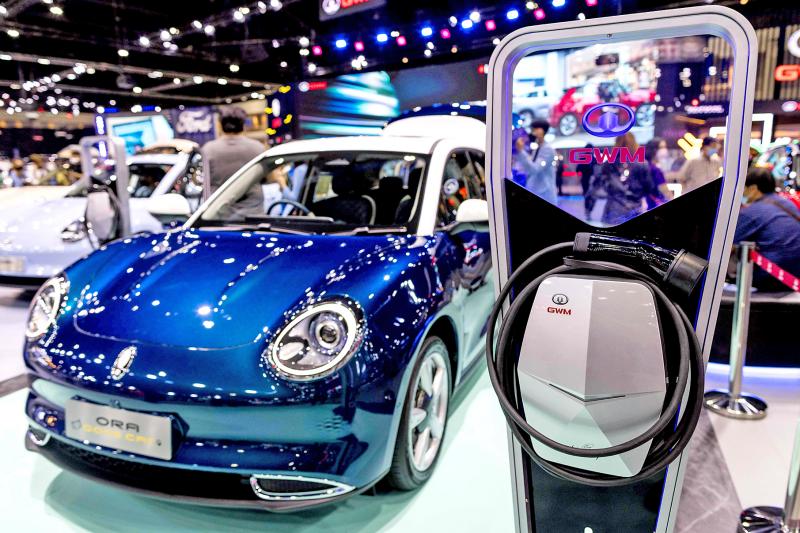Thailand is weighing an array of incentives including lower taxes and cash subsidies to develop the market for electric vehicles (EVs), hoping that the perks spur automakers to invest more and make the Southeast Asian nation a manufacturing hub for cleaner vehicles.
Thai Prime Minister Prayuth Chan-ocha’s Cabinet may soon consider subsidies between 70,000 baht (US$2,155) and 150,000 baht depending on the type and model of vehicle, and lower excise tax and import duties on completely built and partially built EVs, according to a draft proposal viewed by Bloomberg from the National Electric Vehicle Policy Committee headed by Thai Deputy Prime Minister Supattanapong Punmeechaow.
The wider incentives for imports are to last until 2025, when local production is expected to gather momentum. The tax breaks for EV automakers are granted on the condition that companies produce the same number of vehicles or more by 2025 that they import in the preceding years, the proposal said.

Photo: AFP
Supant Monkolsuthree, chairman of the Federation of Thai Industries and a member of the EV policy committee, confirmed the contents of the draft plan.
The EV policy committee is a panel of government and industry officials responsible for drafting a policy roadmap to help Thailand achieve 100 percent zero-emission vehicle production by 2035.
Thailand is bidding to retain its status as a Southeast Asian automobile manufacturing hub as automakers globally pivot to electric vehicles. The nation expects to draw as much as 400 billion baht in EV investment over the coming years.
Foxconn Technology Group (富士康科技集團), Toyota Motor Corp, Great Wall Motor Co (長城汽車) and PTT Pcl are among companies planning to build factories in Thailand.
The subsidy for imported EVs is to be paid to local firms, which in turn pass the benefits to buyers. If the companies are found in breach of the rules, they would lose all incentives, forfeit their bank guarantees and pay back the subsidy with accrued interest, the proposal said.
“The package should be helpful in creating local demand for EVs and also encourage producers to start producing EVs or they will lose the opportunity to benefit from this market,” Supant said.

The US dollar was trading at NT$29.7 at 10am today on the Taipei Foreign Exchange, as the New Taiwan dollar gained NT$1.364 from the previous close last week. The NT dollar continued to rise today, after surging 3.07 percent on Friday. After opening at NT$30.91, the NT dollar gained more than NT$1 in just 15 minutes, briefly passing the NT$30 mark. Before the US Department of the Treasury's semi-annual currency report came out, expectations that the NT dollar would keep rising were already building. The NT dollar on Friday closed at NT$31.064, up by NT$0.953 — a 3.07 percent single-day gain. Today,

‘SHORT TERM’: The local currency would likely remain strong in the near term, driven by anticipated US trade pressure, capital inflows and expectations of a US Fed rate cut The US dollar is expected to fall below NT$30 in the near term, as traders anticipate increased pressure from Washington for Taiwan to allow the New Taiwan dollar to appreciate, Cathay United Bank (國泰世華銀行) chief economist Lin Chi-chao (林啟超) said. Following a sharp drop in the greenback against the NT dollar on Friday, Lin told the Central News Agency that the local currency is likely to remain strong in the short term, driven in part by market psychology surrounding anticipated US policy pressure. On Friday, the US dollar fell NT$0.953, or 3.07 percent, closing at NT$31.064 — its lowest level since Jan.

The New Taiwan dollar and Taiwanese stocks surged on signs that trade tensions between the world’s top two economies might start easing and as US tech earnings boosted the outlook of the nation’s semiconductor exports. The NT dollar strengthened as much as 3.8 percent versus the US dollar to 30.815, the biggest intraday gain since January 2011, closing at NT$31.064. The benchmark TAIEX jumped 2.73 percent to outperform the region’s equity gauges. Outlook for global trade improved after China said it is assessing possible trade talks with the US, providing a boost for the nation’s currency and shares. As the NT dollar

PRESSURE EXPECTED: The appreciation of the NT dollar reflected expectations that Washington would press Taiwan to boost its currency against the US dollar, dealers said Taiwan’s export-oriented semiconductor and auto part manufacturers are expecting their margins to be affected by large foreign exchange losses as the New Taiwan dollar continued to appreciate sharply against the US dollar yesterday. Among major semiconductor manufacturers, ASE Technology Holding Co (日月光), the world’s largest integrated circuit (IC) packaging and testing services provider, said that whenever the NT dollar rises NT$1 against the greenback, its gross margin is cut by about 1.5 percent. The NT dollar traded as strong as NT$29.59 per US dollar before trimming gains to close NT$0.919, or 2.96 percent, higher at NT$30.145 yesterday in Taipei trading